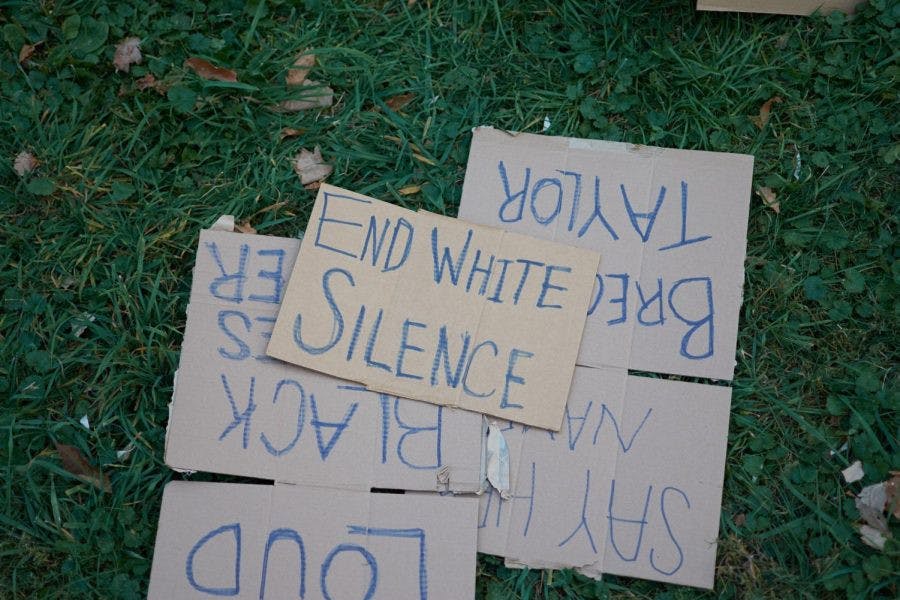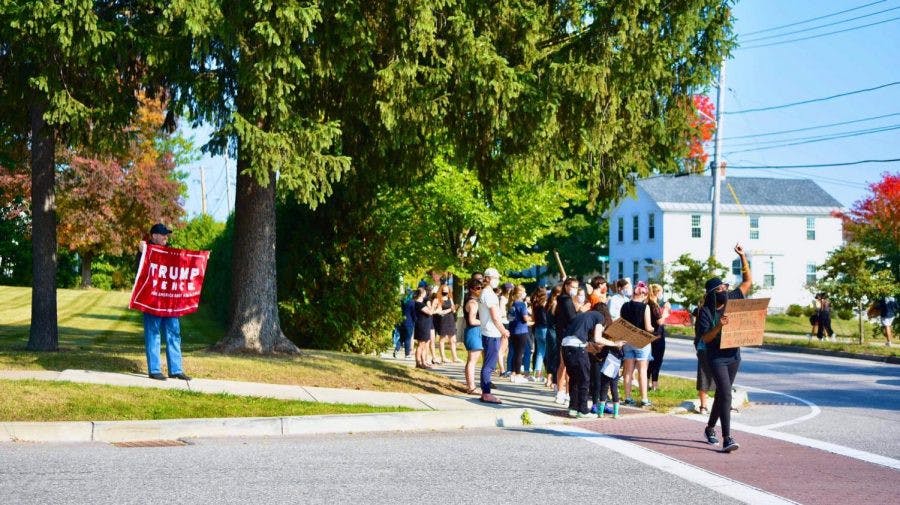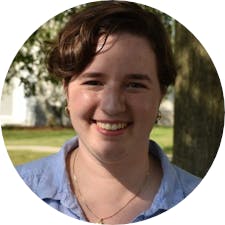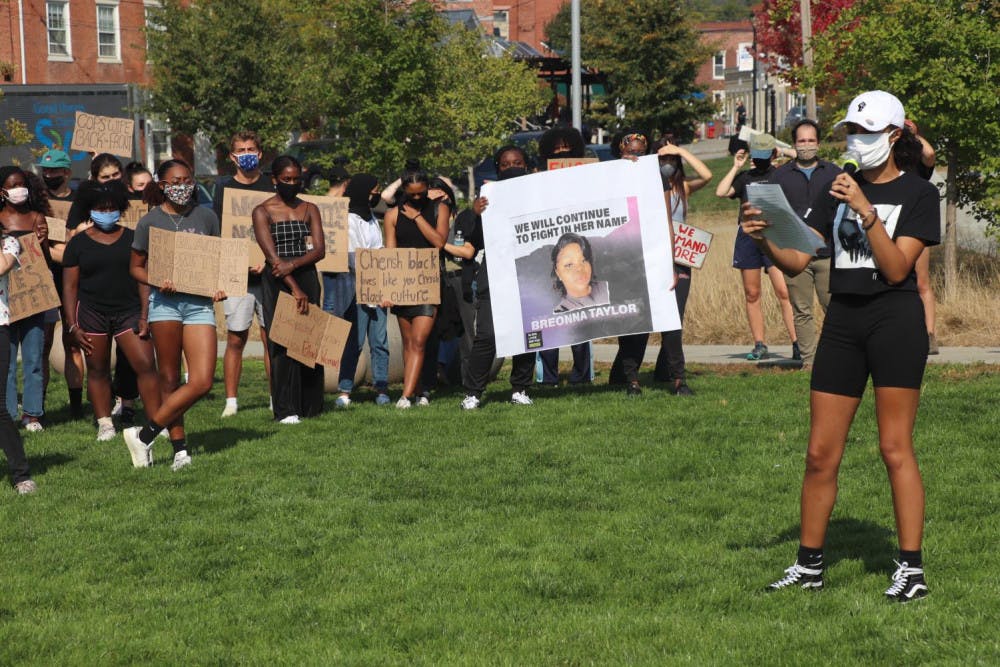Last Thursday, Kaila Thomas ’21 left her Russian class feeling a burning need to do something. The night before, the verdict was announced that none of the Louisville police officers who shot and killed Breonna Taylor in March would be charged for her death. Yet, despite the grief and rage boiling inside of Thomas, the campus seemed unperturbed, the calm unruffled. She took to Instagram, calling for students to march with her the next day in protest of the verdict.

Despite receiving little more than 24 hours of notice, the campus community came out in force. Over 500 people, almost all students with some faculty and community members, attended the protest. Nearly a quarter of the 2,219 students living on campus or in the adjacent area joined.
Students gathered on Battell Beach and the McCullough lawn beginning at 2 p.m. on Friday, proceeding in carefully coordinated groups of 10 and filing down to the college green in neatly arranged pairs for the rally. College staff helped coordinate the march and ensured protesters followed social distancing rules.
Student speakers addressed the crowd at the rally, expressing what it means to be Black on Middlebury’s campus and in the U.S. They called for the college and Middlebury community to take decisive action against racism locally, decrying them for their perceived inaction over the last few months.

Over the summer, Middlebury received a $500,000 donation for anti-racist initiatives on campus. More than a month into the semester, the college has yet to announce plans to put that money to use or reveal a timeline for when they will make and implement those decisions. Some students have become frustrated by their inaction.
“I want Middlebury to show that Black lives matter to them and not just raise money,” Thomas said in an interview with The Campus. “They need to put their mouth where their money is and actually take action.”
In his speech at the rally, Luka Bowen ’22 called for the college to seek out Black students and directly ask them what they need. In an interview with The Campus, he advocated for the college to direct the money toward present material needs, such as financial aid and textbooks, rather than forming unnecessary committees and centers.
“We already have communities that we can go to,” Bowen said. “The real problem is that many Black students can barely afford to go here.”
Both Thomas and Bowen criticized the college for failing to prioritize anti-racism this semester in the same way they focused on Covid-19. While the college mandated that all students take two SafeColleges courses totalling 212 minute on the new Covid-19 protocols, they provided no anti-racism training. Middview orientation programming fell under criticism for a clumsy attempt to insert anti-racism training into their plans at the last minute, centering white students over their BIPOC peers.
“I am more afraid of getting brutalized by the police than getting coronavirus, and I’m scared of getting Covid-19,” Thomas said in her speech. “This is as pressing as coronavirus measures right now.”
Bowen also advocated for the college to defund Public Safety, which he believes exists solely to “harass Black students.” Calls for the college to restructure the department and address its history of alleged racial profiling have grown over the past months.
Despite Middlebury’s promise to reduce public safety presence on campus, their roles have only increased as they have assumed the responsibility for enforcing Covid-19 health guidelines.
Bowen called for white students, faculty, staff and community members to step up and “take the baton” to help Black students fight racism in Middlebury.
“We cannot end the white killing spree of our neighbors, our siblings, our parents, children, friends or any Black person in our community alone. We cannot end racism alone,” Bowen said. “It is time for you white individuals to look inside yourselves and figure out what you can do to help without waiting to be asked.”

Beneath the specific calls for action ran an undercurrent of grief and rage, though not surprise. Breonna Taylor’s murder and trial followed an all-too-familiar pattern of police murdering Black people with impunity. Students were not shocked when the result was the same.
“I wasn’t surprised by the verdict,” said Melynda Payne ‘21. “We should never expect justice from a system that supports white supremacy.”
While Payne did not expect justice, that did not lessen the harm of its denial. Particularly heartbreaking for many students was the fact that the only officer indicted, Brett Hankison, was charged for wrongfully endangering Taylor’s neighbors. As one protester’s sign read, “they only got charged for the bullets that missed.” Several Black students expressed alternately feeling grief, rage and anguish.
“My name is [Breonna] too,” said Breanna Moitt ’24, one of the rally’s speakers, in an interview with The Campus. “I'm a Black woman too, and the idea of me and my death being worth so little that the bullets hitting someone else's door are worth more than my life was so painful to think about.”
For some, a small town in rural Vermont may feel far-removed from police shootings and the murder of Black people throughout the country, but, for many students, it is impossible for such events to feel distant.
“We like to pretend that campus is a bubble, but it's not,” Payne said. “[Racism and police brutality] affect my life here on campus as a Black woman; it's an active trauma. It's not just an Instagram story, it's my life.”
After the rally, the protesters marched out of the college green and into town, gathering on both sides of the Cross Street bridge and spilling out onto the nearby sidewalk as they held signs and chanted at the busy afternoon traffic.
The protest received mixed reactions from passing cars. Some honked in support; others yelled “Trump 2020” and “all lives matter” out of open windows. A truck with a Trump flag revved past protesters before circling back for another pass. One motorcyclist stuck his middle finger up at the crowd.

At the end of the bridge intersecting with South Pleasant Street, one maskless man stood mostly silently, facing protestors with a smirk on his face and a Trump-Pence 2020 sign in his hands. His occasional cheer of “four more years” was drowned out by students chanting “no Trump, no KKK, no facist U.S.A.”
Just hours after the protest, Rodney Adams ’21, who is Black, and Jameel Uddin ’22, who is South Asian, reported being the targets of a racial slur from two white students walking on campus. One student, who was not wearing a mask, reportedly told them, “Well look, here goes them n******.”
“Whether there was a protest on that day or not, sh*t like that is still going to happen,” Adams told The Campus. “It’s even more of a reason why we need action to start from the institution to say that this is not okay and that this shouldn’t be happening any more.”
One of the two students involved came forward, and the college has promised to address the incident.
Victoria Netter ’22, who is Black, said that she frequently experiences racism on campus, even if it isn't always as blatant as what happened to Adams and Uddin. Those everyday experiences of racism, compounded with larger scale events such as the death of Breonna Taylor and the failure of the grand jury to indict her killers, can wear Black students down and contribute to a sense of hopelessness and helplessness, according to Netter. Still, when Netter spoke to The Campus the night before the protest, she remained resolute and determined to attend the march and take action in Middlebury.
“I don’t feel hopeless, otherwise I wouldn’t be [protesting],” said Netter. “You can only keep moving forward if you have something to move forward to.”
Student activists plan to continue pushing for anti-racist change and racial justice at Middlebury throughout the upcoming year.
“This work, anti-racism work, starts locally,” Thomas said in her speech. “Change starts now, it starts here and it starts with us.”

Sophia McDermott-Hughes ’23.5 (they/them) is an editor at large.
They previously served as a news editor and senior news writer.
McDermott-Hughes is a joint Arabic and anthropology and Arabic major.
Over the summer, they worked as a general assignment reporter at Morocco World News, the main English-language paper in Morocco.
In the summer of 2021 they reported for statewide digital newspaper VTDigger, focusing on issues relating to migrant workers and immigration.
In 2018 and 2019, McDermott-Hughes worked as a reporter on the Since Parkland Project, a partnership with the Trace and the Miami Herald, which chronicled the lives of the more than 1,200 children killed by gun violence in the United States in the year since the Marjory Stoneman Douglas High School shooting in Florida.




